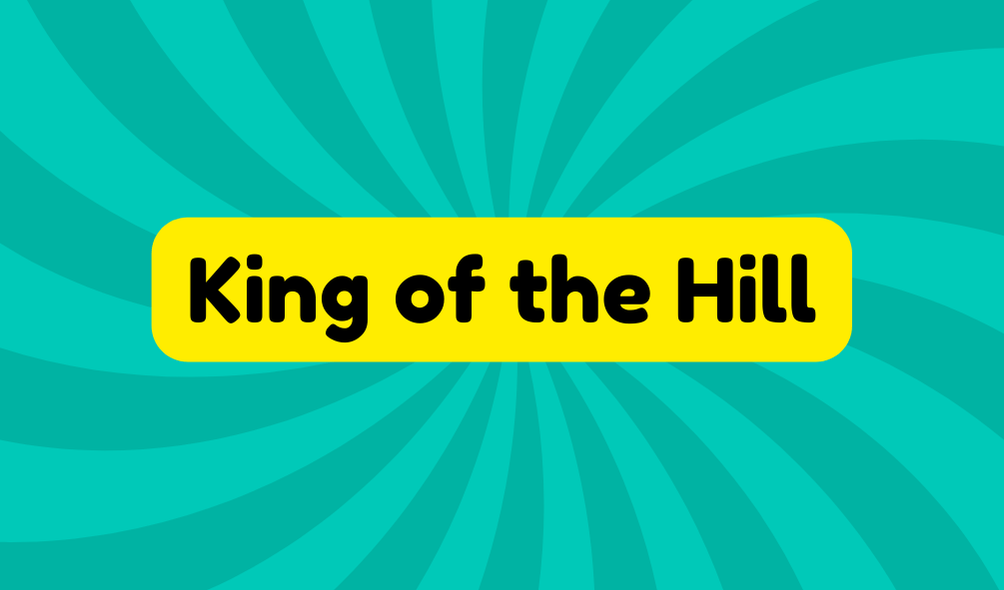"King of the hill" describes a competitive situation where one individual or group claims superiority over others. It originates from a children's playground game that emphasizes social hierarchies and the desire to maintain a dominant position. Within this framework, players aim to defend their spot at the top, demonstrating agility and strategy. This phrase highlights ongoing competition, whether in sports, workplaces, or personal lives—often leading to both innovation and unhealthy rivalries. For example, you might say, "After years of practice, she became the king of the hill in local soccer." There's much more intriguing context to explore about this phrase.
Synonyms
Frequently, you might hear terms like "top dog," "champion," or "leader" when discussing someone who's a "king of the hill" in their field. While these synonyms all suggest a sense of dominance dynamics and a competitive spirit, it's crucial to reflect on the weight they carry. Oftentimes, people don't realize that such titles come with pressure and competition.
- "Pacesetter" indicates innovation and forward thinking.
- "Front-runner" shares a sense of leading but can imply temporary status.
- "Trophy-holder" is a direct reminder of past achievements rather than current standings.
Example of Sentences
One way to understand the concept of "king of the hill" is through its application in various sentences. Take a moment to reflect on how it applies in real life, especially around playground games. Here are some examples:
- The current champions rule the schoolyard, showing off their strength in every game.
- After years of practice, you've finally become the king of the hill in your local sports league.
- It's no surprise kids get injured during king of the hill; the fight for dominance can escalate quickly.
These sentences reveal how this concept embodies competition and authority in different settings. In both playful and serious environments, "king of the hill" captures the essence of rivalry and the relentless quest for being recognized at the top.
Origin
You might be surprised to learn that the origins of "king of the hill" can be traced back to a simple playground game where children vie for dominance by defending a specific elevated spot. This game reflects not just fun but also the intricate playground dynamics and fierce children's competition. As kids climb to claim their spot, they're maneuvering through early social hierarchies and power struggles.
| Aspect | Description |
|---|---|
| Game Type | Physical, competitive |
| Social Interaction | Rule enforcement and strategy |
| Key Skill | Defense and agility |
| Broader Implication | Insight into leadership and dominance |
Understanding this game sheds light on the underlying behaviors that persist into adulthood, showcasing competition's role throughout life.
Collocations
Considering the phrase "king of the hill," you'll find several interesting collocations that enhance its meaning and context. These phrases illustrate the complexities of competitive dominance and interactions within various environments.
- Playground dynamics: This highlights the informal social structures kids navigate during games.
- Chasing the king: This captures the relentless pursuit of top status in any field.
- Maintaining dominance: This reflects the continuous effort required to stay on top.
Understanding these collocations not only adds depth to your vocabulary but also prompts you to think critically about the implications of competition. In professional settings, recognize how playground dynamics often mirror adult interactions, revealing that the struggles for superiority are universal. Embracing this insight can help you navigate your own competitive landscape more effectively.
How to Use in Everyday Language
In various conversations, referring to someone as the "king of the hill" can vividly illustrate their position as a leader or champion in a specific area. You can use this phrase in practical applications to describe someone excelling in their field, whether it's a top salesperson or an award-winning artist. In conversational contexts, you might say, "She's the king of the hill in digital marketing," to emphasize her expertise. However, be cautious; using such terms can also come off as overly dramatic or reduce someone's complex achievements to a simple label. Striking the right balance is key. Remember, while it's exciting to applaud the top achievers, it's important to recognize that success is often a team effort.
Why Is It Still Relevant Today?
The concept of being the "king of the hill" remains relevant today because it encapsulates our ongoing fascination with competition and achievement. In a world driven by social dynamics and a competitive spirit, individuals are constantly working to assert their dominance. Whether in business, sports, or personal relationships, this desire manifests itself in various ways, often pushing people to innovate or improve. However, this pursuit can also lead to unhealthy rivalries and pressure to conform. Understanding this balance is essential; being on top is great, but the scramble for the crown can be exhausting. Recognizing the implications of this mindset can help you navigate the complexities of your own ambitions, fostering healthier competition and collaboration along the way.







